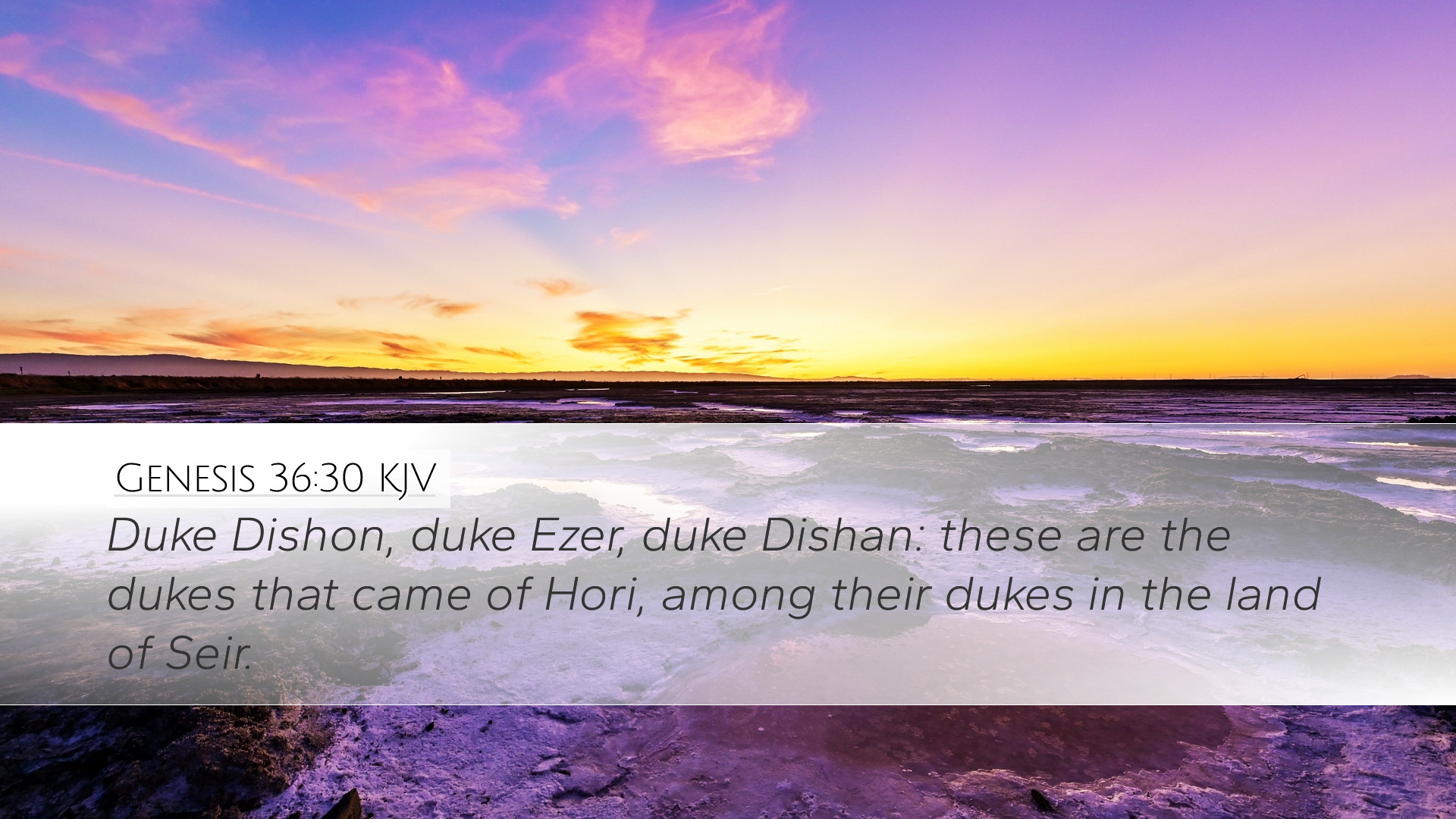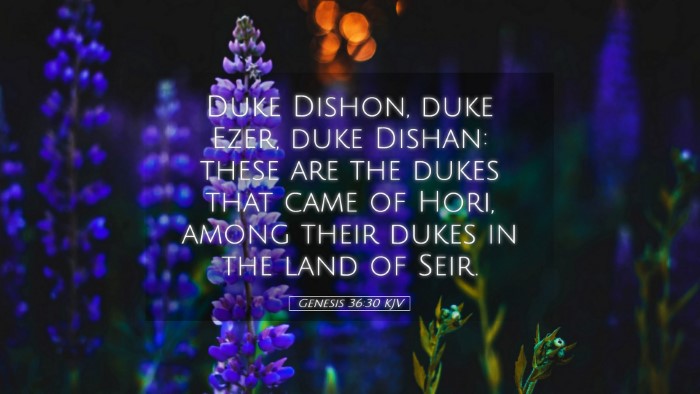Commentary on Genesis 36:30
Verse: Genesis 36:30 - "These are the dukes of the land of Edom, according to their dwellings in the land of their possession: he is Esau the father of the Edomites."
Introduction
The verse at hand serves as a concluding note in the account of Esau and the establishment of the Edomite lineage. It succinctly captures the political and social organization that emerged from Esau's descendants, highlighting the significance of names and familial ties in biblical narratives.
Historical Context
Understanding this verse requires a brief exploration of the historical context surrounding Esau, his lineage, and the importance of Edom. Esau, the red-haired twin brother of Jacob, sold his birthright for a meal and later he and Jacob became the fathers of two distinct nations. The Edomites, descended from Esau, are an important group in the Old Testament, often depicted in relation to Israel.
Commentary Insights
Matthew Henry's Commentary
Henry emphasizes that this passage showcases not only the genealogy of Esau but also provides insight into societal structures within the ancient Near East. He notes the importance of "dukes," or leaders, and the implications of territory and leadership in the context of blessed familial lines. He posits that the Edomites, being related to the Israelites, serve as a reminder of the covenant community's broader historical narrative.
Albert Barnes' Notes
Barnes comments on the phrase "dukes" being representative of rulers or tribal leaders, likening the Edomite structure to that of the Israelites. He highlights the geopolitical significance of Edom during the period of the monarchy in Israel, noting that while Edom was a neighbor of Israel, the two nations had a tumultuous relationship. This verse encapsulates the establishment of Edom's governance and territorial claims, reinforcing the historical divisions between the descendants of Jacob and Esau.
Adam Clarke's Commentary
Clarke brings out the etymological aspects of the names of the dukes of Edom and discusses their implications. He reflects on the identity politics inherent in naming and lineage, pointing out that Esau's role as the "father of the Edomites" is critical for understanding their national identity. The designation of dukes emphasizes a structured leadership that points to both socio-political organization and the divine order it represents in the unfolding biblical narrative.
Theological Reflections
This verse serves as a potent reminder of God’s sovereignty over nations and lineages. While the Edomites may be seen as adversaries to the Israelites, it is crucial to recognize that their establishment is within the purview of God’s broader purposes. The theme of rivalry between brothers, illustrated here, encapsulates an essential aspect of human relationships and divine providence.
Identity and Heritage
The verse highlights the significance of heritage in shaping identity. The repeated affirmations of lineage and land entail a deep connection to one's origins, indicative of the broader biblical theme that values family and heritage. For pastors and theologians, this prompts a reflection on how our identities are rooted in Christ, and how our spiritual heritage shapes our community and our mission.
Sociopolitical Dynamics
The verse gives insight into the sociopolitical dynamics of the nation of Edom, illustrating the early formation of political entities in the biblical world. The establishment of dukes signifies the formation of governance, and it underscores the importance of leadership structures in the faith community. Pastors and scholars might draw parallels with contemporary leadership challenges within the church.
Lessons for Today
- The significance of digging into ancestry: Understanding the past enriches contemporary faith experiences.
- Leadership and governance: The structure seen in the Edomite lineage invites reflection on the nature of leadership today.
- Divine sovereignty: The history of nations, including adversarial relationships, serves to remind believers of God's overarching plans.
Conclusion
Genesis 36:30, while being merely a record of genealogy, is rich with implications for our understanding of history, identity, and divine purpose. By blending insights from various commentaries, we see how this seemingly simple verse opens a gateway to complex themes of heritage, governance, and God’s providence. For pastors, students, theologians, and scholars, it invites deeper reflection on not only the past of the Edomites but the ways in which our own identities and communities are shaped by God’s unfolding story.


